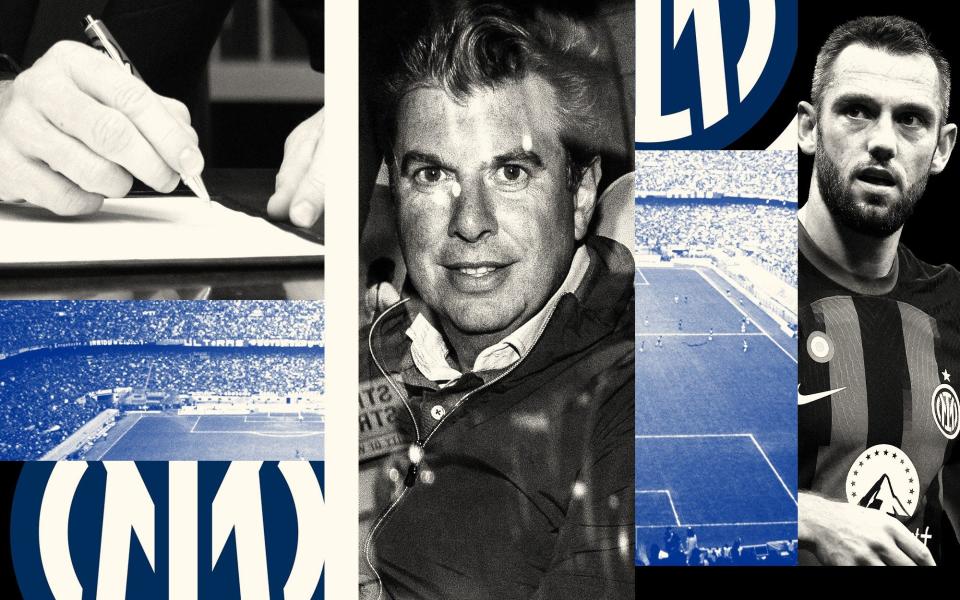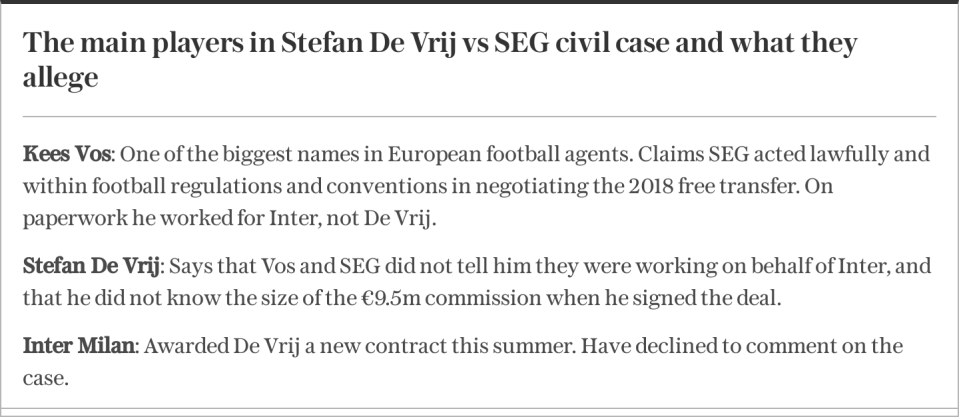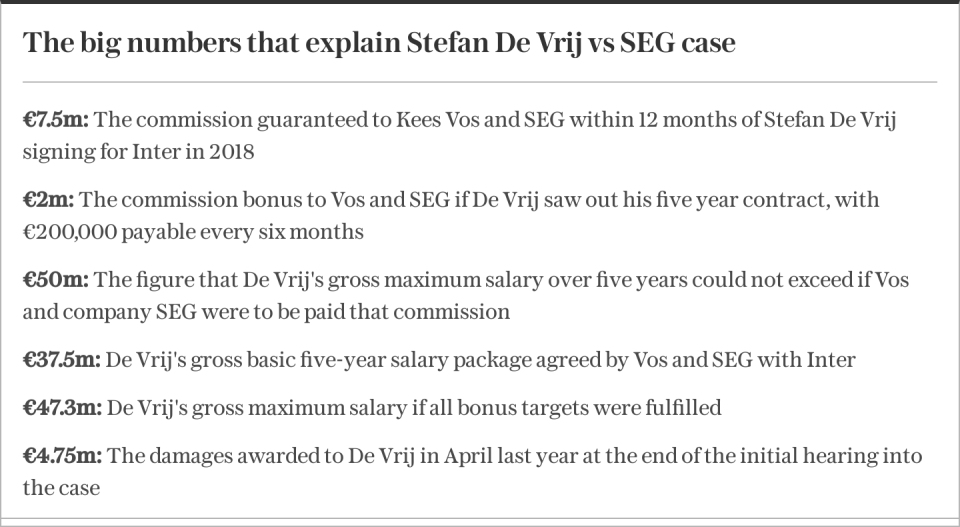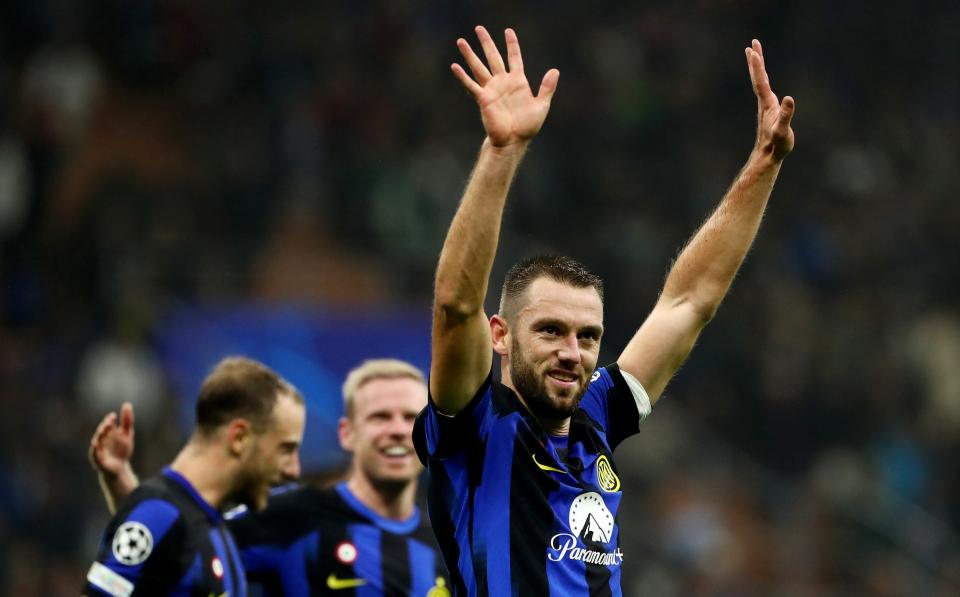Special report: Inside the court case that puts Erik ten Hag's agent in the spotlight

A landmark case in European football reaches its second act in December with €4.75 million (£4.1 million) on the line as well as the reputation of one of the game’s most powerful agents – Kees Vos, who represents Manchester United manager Erik ten Hag.
Vos, and his Dutch agency Sports Entertainment Group (SEG), will be in the Dutch court of appeal in Amsterdam to face one of their most prominent former clients, Inter Milan and Holland defender Stefan De Vrij. It promises to be an intriguing replay of the hearing in February last year when De Vrij won damages in a civil case against Vos and SEG over their handling of his free transfer to Inter Milan in 2018. De Vrij was awarded €4.75 million, plus interest.
On one side is the big-hitter Dutch agent Vos, who represents the United manager and has been a key figure in some of the major deals into Old Trafford, including Rasmus Hojlund’s £72 million move in the summer. On the other, a 62-cap Dutch international who believes his erstwhile agency earned at his expense in his lucrative free transfer.
It asks a wider question many leading players might ponder themselves: who gets paid what in a transfer deal? And what alliances might be struck between agents and clubs to secure the services of players – especially those, as De Vrij was, who are free agents?
In April last year the Dutch court found De Vrij had not been made aware of the full scale of the €9.5 million commission earned by SEG on the deal that saw him join Inter four years earlier. It subsequently awarded him half that total in damages.
Vos, and SEG, rejected the accusation that their commission meant De Vrij missed out on a more lucrative contract than the deal he eventually signed. It is SEG which has brought the case to Amsterdam’s court of appeal - Hof van beroep – in front of three judges, and Vos believes he will be vindicated.
De Vrij and his representatives declined to comment on the case before it goes in front of the court next month. De Vrij is understood to regard his stance as a point of principle for players who are not apprised of the full details of negotiations between influential agents and clubs. Those close to him say he feels a sense of betrayal at the way he was treated by an agency, from which some of the staff had become friends.
For Vos, whose agency also represent Hojlund, Cody Gakpo, Daley Blind and Robin Van Persie – and include Pep Guardiola’s agent brother Pere as a director – there is a very different view. Vos says the first hearing fundamentally misunderstood the nature of deal-making in elite football, and the regulations that govern it.
Both sides say they sought to settle the dispute, but without success. For the second time, it plays out in court on Dec 1.
Vos and his SEG colleague Jeroen Hoogewerf deny any wrongdoing. Nevertheless, the second round of the case is likely to increase the focus on Ten Hag’s agent, the man who brokered the deal to bring him to Old Trafford and won last summer’s race between leading agents to represent Hojlund.
‘It hurts that people question my integrity’
Neither player nor agency are pleading poverty – both got huge rewards from the deal. The question goes deeper than that – who was entitled to take what, and what De Vrij knew about the entirety of the deal. The details that emerged last year were an insight into the astonishing rewards for agents – as well as players – at the heart of big deals.

“It hurts that people question my integrity,” Vos tells Telegraph Sport. “That is the only thing I have in life. Money is money and this is just a discussion in which somebody wants more. You can have the talk about that - no problem - but if you start questioning my integrity then you come to my core. I didn’t do anything wrong, so it is frustrating.”
The issue will be watched with interest from Old Trafford where results have intensified the pressure on Ten Hag and Sir Jim Ratcliffe’s acquisition of 25 per cent of the club looms. The Ineos billionaire is understood to want full control of football operations and chief executive Richard Arnold has already announced his departure. Although what that means for Ten Hag is not yet clear.
In the meantime, it appears Vos has had some degree of influence at the club where he represents the manager. In an Instagram post in August, Vos shared a picture of himself outside the Old Trafford home dressing room with the comment: “My wife and I have a different meaning of the word ‘home’ these days”. He was also involved in the loan deal to bring the Dutch born Morocco international Sofyan Amrabat from Fiorentina in the summer.
‘Crying all the way to the bank’
De Vrij, 31, grew up in the village of Ouderkerk aan den Ijssel, east of Rotterdam. Aged 10 his talent was noticed by scouts from Feyenoord and he joined their academy. He made his debut for the first team in 2009 aged 17 and within three years he was a senior Holland international. At the 2014 World Cup, in which Holland finished third, he was one of only two Dutchmen voted in the Fifa team of the tournament. That summer, he signed for Lazio.
By the spring of 2018, De Vrij was in the final six months of his deal with the Serie A club. At the end of February 2018, he signed a five-year contract with Inter, to begin on June 30. He signed, court documents say, for a basic gross salary over five years of €37.5 million. His annual bonus, if fully achieved, totalled €2.15 million although hitting the maximum would require Inter to win the league and cup double and the Champions League. The most he could earn over five years, including bonuses, was €47.3 million gross. He was, or he said he thought, represented by Vos and SEG.
That maximum figure was critical: De Vrij said unbeknownst to him that SEG’s own fee was based on them persuading the player to sign for less than a total basic salary of €50 million gross over the contract span. The rewards for SEG doing so were considerable. In return the agency would receive:
A total of €7.5 million paid in three instalments over 12 months
A further €2 million paid in instalments of €200,000 every six months for as long as De Vrij stayed at Inter
7.5 per cent of any future transfer fee for De Vrij
SEG says it demonstrated in court that €50 million gross basic figure was immaterial. They needed to conclude a contract with a set of conditions to be met in order for Inter to pay their fee. The figure of €50 million was decided upon, not because it was attainable for De Vrij but because it was not. Inter had agreed a guaranteed net sum for the player. SEG said that meant there was a possibility the gross package could grow if there was a change in the top rate of income tax. They chose a figure of €50 million gross because it was safely out of reach.
“We did an amazing deal,” Vos says, “and it sounds weird but I think he [De Vrij] should be very thankful to me. It was a five-year deal. His club [Lazio] offered him a one-year deal on €2 million net and he could sign a five-year deal on €4 million net and [a potential] €1 million bonuses at Inter which is a bigger name and in the Champions League. It was an amazing achievement. The first year he was very happy. He was crying all the way to the bank.”
De Vrij’s lawyers say that the deal offered to the player by Lazio was also worth an extra €4 million net. Lazio proposed extending De Vrij’s contract by one year which would enable them to sell him for a transfer fee in that summer of 2018. In return they offered him a share of what was estimated to be a £25 million transfer fee, and an additional signing-on bonus.
The De Vrij side said their client was sufficiently in demand to command the level of wages Inter were offering without being a free agent. Vos and SEG say the opposite. They claim they rescued the deal with Inter after De Vrij cancelled a scheduled medical with the club in January 2018.

De Vrij launches legal action
De Vrij immediately became a regular in the 2018 Inter side that would go on to win Serie A in 2020-21. But he became suspicious about his deal when Inter team-mates asked him how much he had received as a signing-on fee – a common bonus paid to players who join as free agents. The fee is paid by clubs in recognition of the transfer fee they have saved. De Vrij said he had received none. One year on from the move, De Vrij instructed new lawyers to investigate.
It was those lawyers, the Belgian firm Cresta, which represented De Vrij’s then Inter team-mate Romelu Lukaku, that secured the disclosure of the commission agreement between Inter and SEG. De Vrij’s side would later successfully argue he was not made aware by SEG of the full size of its commission. Although he was told there was a sell-on fee, De Vrij’s lawyers said he had never seen any contract detailing the size of it or formalising the arrangement. SEG say they made De Vrij aware of the details of their commission.
De Vrij’s side argued that a far greater share of Inter’s total budget to sign him should have gone to the player rather than those he thought were acting for him. They also said that their client bore all the risk under Italian law of tax penalties, in spite of Inter agreeing a guaranteed net salary. SEG said that the indemnity given by Inter meant that threat was non-existent.
In May 2021, De Vrij, then 29, launched legal action against the agency who had represented him, up to that point, for his entire professional career. More than two years on he remains a first team player at Inter. He is no longer an automatic starter for Holland, although he started both this month’s Euro 2024 qualifiers. He runs a successful property investment company with his brother, Niels. His football career has been lucrative and his future undoubtedly secured. Nevertheless, he has taken this legal battle very seriously.
‘In Italy, most agents work for clubs’
The key part of the case came down to which side SEG were working for. According to the paperwork, Vos and SEG were working for Inter and not De Vrij. In terms of the relationship, De Vrij’s assumption was that SEG were his agents. They had negotiated both De Vrij’s professional deals at Feyenoord and his move to Lazio. In addition, while talks progressed with Inter in early 2018, SEG were also negotiating that possible renewal with Lazio. In private internal emails, and public social media posts submitted to the court, De Vrij was referred to by SEG as its client in respect of those separate negotiations.
When he learned of that agreement De Vrij saw it as a betrayal of the relationship with the agency that had represented him since he was a 16-year-old at Feyenoord. For Vos and SEG it was simply a way of doing business – in particular, the way of doing business in Italy. Vos has said that SEG struck the same agreement with Lazio – formally working on behalf of them rather than De Vrij - when they negotiated his transfer to Lazio from Feyenoord in 2014.
What had SEG told De Vrij, and what had he understood his relationship to be with SEG? De Vrij only signed three pages of his employment agreement with Inter which included the detail that it was the club, and not the player, who were formally represented by SEG as well as the commission. Vos says that De Vrij would not have signed the agreement, which was between club and player, if he was not happy with all parts of it.
Vos says an agent representing the club was normal practice in Italian football. The convention, he claims, is different to England and other countries where a representation agreement between the player and the agent has to be signed and registered for the latter to be paid. Vos says he does not currently have a formal representation agreement with Ten Hag, or Van Persie, the Feyenoord Under-18s manager. At other times he says clients do sign representation agreements which are lodged with national associations – as per the local convention.
In Italy, Vos says, clubs prefer the agent officially to work for them in order that the tax liability does not fall upon the player. He tells Telegraph Sport: “In Italy, 95 per cent of transactions are done by agents on behalf of clubs. To say that it is strange that we operated on behalf of the club is not true. To say that he was not aware of it was not true. He was aware and he signed the employment agreement [with Inter] to agree that we [SEG] represented the club. It is to his benefit that we represent the club because there are no tax consequences for him.”
Inter would not have paid any more, Vos says, than what was agreed. The commission was agreed with Inter after De Vrij’s wage deal was negotiated and SEG claimed that the two were unrelated. SEG’s lawyers said in court the deal made De Vrij, at the time, the best paid defender at Inter. SEG argued his wages could not have exceeded the club’s highest paid player of the time, the Argentine striker Mauro Icardi.
De Vrij’s side believe the agreement failed the player on two counts – in terms of the value it delivered for the player, and also the potential tax liability it opened up. If SEG were claiming to work for Inter and not the player then, regardless of convention, that did not accurately reflect the reality to the tax authorities.

‘We’ve been involved in more than 2,200 deals’
Vos and SEG argued in court that they were not there to represent De Vrij but were instead brokers in the transfer – “market makers”, as the court documents record, bringing both sides together. SEG argued De Vrij had never paid them for services. It said that because there was no agreement with them and De Vrij, there could be no accusation of a shortcoming on SEG’s point.
Vos says on this point: “No player on earth happily signs a representation agreement because it states if a deal happens he is going to pay you – and they don’t like it. The custom is that the clubs are paying the fee. In the music industry, in cycling, in esports, the client pays. Only in football does the team or the club pay on behalf of the player.”
As for the extra signing-on fee Vos maintains that was incorporated into the overall wage package, as it had been in other free signings at Inter including Davy Klaassen and Andre Onana, now at Manchester United. Vos says: “We’ve been involved in more than 2,200 deals over a period of 23 years. Salary, signing-on fee or loyalty fee are the fixed parts of the remuneration of a player and it doesn’t matter what it’s called … the discussion about a signing-on fee is a semantic one. It should be about the total fixed remuneration a player gets.”
De Vrij’s side claimed losses of €12.5 million. They did so by calculating what he would have earned on a salary of €10 million per year over five years – the €50 million in the contract between SEG and Inter - less the salary €37.5 million he was paid by Inter. The court limited De Vrij’s claim to €9.5 million, the size of the commission earned by SEG. De Vrij also sought indemnity from SEG to protect him from an investigation from the Italian tax authorities.
Previously, when De Vrij was at Feyenoord, SEG had been paid a commission of five per cent and then six per cent of his contract value for their negotiations. Fifa’s recommendation for commission in its new regulations for agents is three per cent. SEG says that the €9.5 million figure was simply an agreed lump sum and not a percentage. De Vrij’s lawyers say the commission paid to SEG for the deal is far beyond what is reasonable. That €9.5 million equated to 25 per cent of De Vrij’s €37.5 million gross salary.
In addition, De Vrij’s lawyers pointed out that had, for example, De Vrij been sold after one year, in 2019, SEG would still have earned a guaranteed €7.9 million. On De Vrij’s annual base salary of €7.5 million, that would represent a 105 per cent commission. The agency would then also have earned 3.75 per cent of the transfer fee.
The court decided that there was no guarantee that Inter would be prepared to pay De Vrij a total of €50 million over the five years. It did, however, find that De Vrij was not made aware of the full size of the commission and therefore was eligible for what is known in Dutch law as “kans schade” – “opportunity damages”. In short, De Vrij had been denied the chance to negotiate a better deal with Inter because he was not cognisant of the whole SEG commission.
‘It is not uncommon’
In court next month, SEG will seek to have the damages award overturned. De Vrij has found himself the leading figure in a key case for famous players who do not fully understand the complex deals that can be agreed between clubs and powerful agencies. SEG maintains that it simply did a good deal for all parties involved, De Vrij included. As for Inter, they reported last month in their financial results that they had paid an agent’s fee of €8 million to sign the France international Marcus Thuram, who was a free transfer. There is no suggestion of any wrongdoing on the Thuram deal.
In July, De Vrij signed a new two-year contract at Inter, negotiated by his new agent, the Italian Federico Pastorello. De Vrij has, however, refused to relent in his dispute with SEG.
On his own fee for the De Vrij deal, Vos admits that representing the very best players is a lucrative business. “I’m not trying to say it is not a lot of money,” he says. “But it is not uncommon in this industry.”

